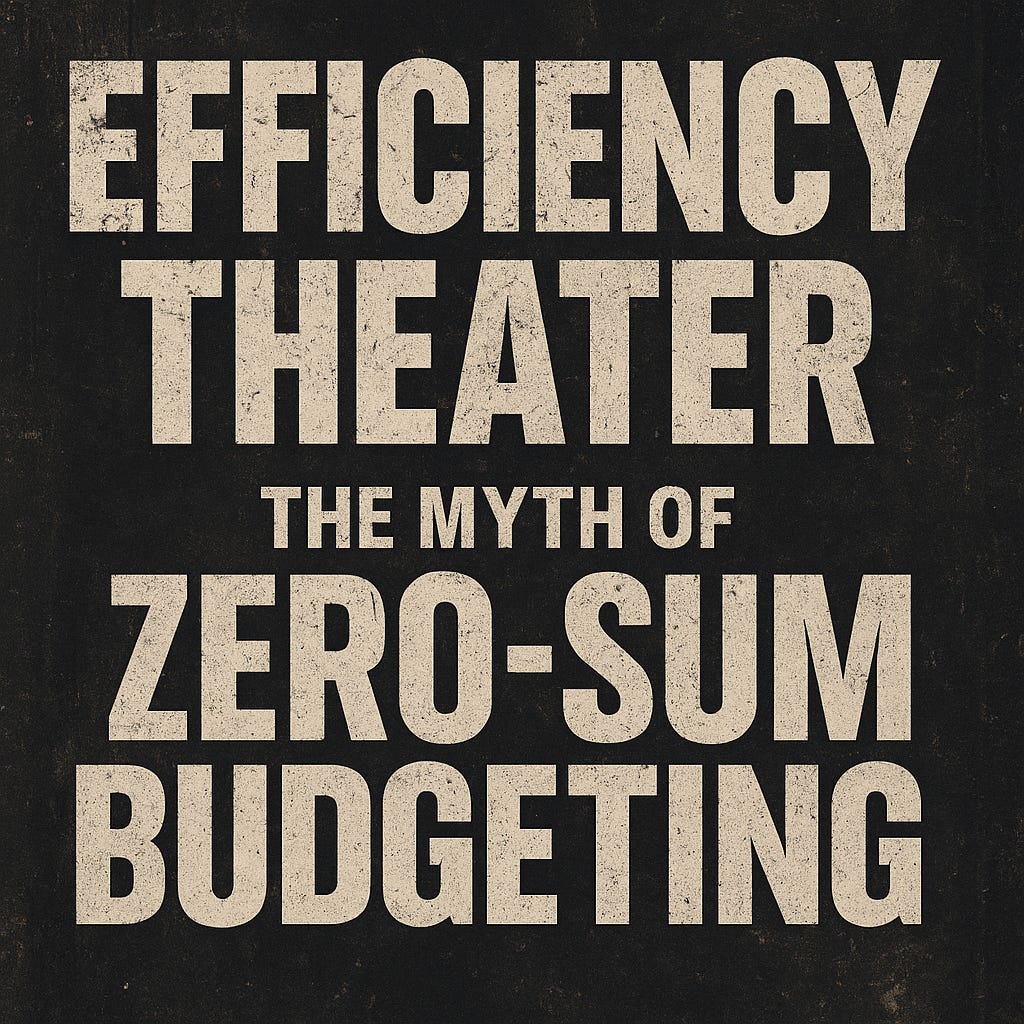Efficiency Theater: The Myth of Zero-Sum Budgeting
Zero-sum budgeting is sold as fiscal discipline. In reality, it’s corporate cosplay for control freaks.
Welcome back to Ops Anarchy—where we say the quiet part loud, call out process theater, and shine a spotlight on the bureaucratic bullshit that keeps good operators stuck in mediocrity.
Today’s target: zero-sum budgeting.
It sounds clean. Precise. Disciplined.
It’s supposed to create accountability, reduce bloat, and bring every dollar under scrutiny.
But here’s what it actually does:
It punishes smart operators.
It rewards waste.
It turns budgeting into a ritual of fear and fakery.
Let’s break this down.
What the Hell Is Zero-Sum Budgeting?
Zero-sum budgeting is the idea that every single dollar must be re-justified from scratch every cycle (quarter, year, etc.). No rollover. No assumptions. No grace.
Sound familiar?
It’s the budget version of Groundhog Day—every team must fight for their existence all over again, whether they crushed it last year or not.
The theory says: This keeps spending lean and focused.
The reality is: It creates a Hunger Games-style budget war where survival goes to whoever can bullshit best.
The Dumb Incentives It Creates
1. "Spend it or lose it" panic
You come in under budget? Congrats. You’ll be punished next cycle with a lower allocation.
So what do people do? They blow the rest of their budget on garbage in Q4 just to avoid getting cut next year.
Think:
Fancy software no one uses
Unnecessary vendor contracts
Panic hiring
End-of-year "team offsites" at resorts
You’re incentivized to be inefficient just to protect future funding.
2. Death by deck
Every quarter becomes a pitch contest. Every manager is suddenly a politician.
Forget running ops—you’re now spending 3 weeks building a deck to justify keeping your headcount.
And if you’re not loud, dramatic, or senior enough? Good luck.
3. Fake planning theater
Want to try something new mid-year? Too bad. Wasn’t in the Q1 plan.
Need to scale a process fast? Gotta wait for the next budget cycle.
See the problem? Zero-sum budgeting kills agility.
Ops becomes a reactive slog instead of a strategic asset.
How It Destroys Good Operators
Here’s the thing no CFO wants to admit:
Zero-sum budgeting trains your best people to play defense.
Good operators do three things:
Spend responsibly
Iterate in real time
Focus on outcomes, not optics
But zero-sum budgeting punishes that.
If you save money? You lose it.
If you ask for less? You’re seen as non-essential.
If you run lean? You get ignored while the loud, bloated teams grab more.
Eventually, smart ops leaders learn to game the system or leave.
And the ones who stay?
They stop optimizing. They start budget hoarding.
Who Actually Wins?
Let’s be honest. The real winners in zero-sum systems are the people who know how to:
Inflate budget requests
Pad headcount needs
Throw in extra line items as trade bait
Spend every last dollar so they don’t get slashed
It rewards the best politicians—not the best operators.
And finance? Finance doesn’t love this either.
You think FP&A folks like chasing down 47 teams for justifications that haven’t changed since last year? They don’t.
But the system persists because zero-sum budgeting feels like control. And a lot of execs would rather feel in control than actually be efficient.
The Real Operational Cost
1. Wasted time
Teams spend weeks building budget decks, approval flows, and fake forecasts.
That’s time not spent improving ops, solving problems, or shipping product.
2. Killed innovation
Want to try a new tool? Wait till next fiscal.
Want to test a growth experiment? Wasn’t in the budget.
You end up with a process that punishes experimentation and rewards bureaucracy.
3. Distrust between teams
Ops vs. finance becomes adversarial.
Teams start hiding needs or padding numbers.
Collaboration dies. Budget theater thrives.
So What Actually Works?
Zero-sum isn’t the only game in town.
Here are better models smart companies are using:
1. Rolling Forecasts
Revisit budgets monthly or quarterly, not yearly
Allows for agile reallocation based on current needs
2. Outcome-Based Budgeting
Fund initiatives based on KPIs, not just departments
Track ROI in real time
3. Ops-Owned Reserve Pools
Set aside flexible budgets managed by ops leads
Fund projects that prove impact
4. Transparent Budget Audits
Make budget performance public internally
Show who used funds well and who wasted them
None of these are perfect.
But all of them are better than the zero-sum death spiral.
Final Call: Stop Worshiping Scarcity Theater
Zero-sum budgeting makes execs feel disciplined.
It makes finance feel in control.
But if you care about actual performance, here’s the truth:
Budgeting should be about leverage, not fear.
You don’t win by punishing the teams that spent responsibly. You win by giving the best operators the fuel to run.
Want real efficiency? Stop building systems that reward waste and fear.
Budget for impact. Budget for experimentation. Budget like you want to win—not survive another quarter of spreadsheet theater.
– Ops Anarchy


